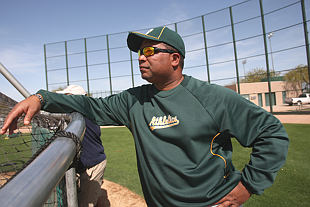 Hopefully, the Oakland Athletics give minor league coach Todd Steverson points for original thinking. The president of the Class A California League, on the other hand, gave Steverson a yearlong ban from the dugout after he ordered three intentional balks during a recent extra-inning game in order to speed up the outcome. That's right: Steverson told his own pitchers to balk on purpose.
Hopefully, the Oakland Athletics give minor league coach Todd Steverson points for original thinking. The president of the Class A California League, on the other hand, gave Steverson a yearlong ban from the dugout after he ordered three intentional balks during a recent extra-inning game in order to speed up the outcome. That's right: Steverson told his own pitchers to balk on purpose.
Steverson was filling in as manager for the Stockton Ports, a Class A club of the A's, for a game June 23 against the Modesto Nuts (aptly named for this story). By the 16th inning, the score was tied, both teams had run out of pitchers and were using position players on the mound. Concerned about injury if he continued to use inexperienced players out of position, Steverson came up with an alternative. Columnist Brian VanderBeek of the Modesto Bee has the details:
Steverson, Oakland's roving hitting instructor, ordered Josh Whitaker, an outfielder and the second Ports' position player to pitch that night, to commit balks to move Modesto runners into scoring position. Whitaker blatantly balked twice in the 17th, but the Nuts could not get the game-ending hit until the 18th, after another balk.
On Monday, league president Charlie Blaney fined Steverson and banned him from any California League dugout during a game for one year. As VanderBeek also wrote, it's actually easy to see where Steverson and Blaney are coming from.
Blaney is trying to maintain the integrity of games his teams play. As with any other contest, fans want to be entertained but they also want a fair fight with everything on the level. They want a winner and a loser, if possible:
"While Stockton Interim Manager Todd Steverson's intent was to protect his players from injury … he made an error in judgment by instructing his pitcher to advance 3 base runners via intentional balk for the purpose of expediting the end of the game … Mr. Steverson's decision to advance the opposing team's base runners into scoring position compromised the integrity of the game, which is paramount in this great game of ours."
Steverson realizes that the first object of minor league baseball is to develop the players for the next level. Winning is important, but no higher than secondary. He believed his players were at risk over the outcome of a game that mattered less than their health.
There should be a better way to safety, however, than tanking the game.
VanderBeek notes that by taking his team off the field and forfeiting, Steverson would have subjected Stockton to a $50,000 fine. Most major league teams would be able to pay that, if they wished, but you know how tight money is for the A's. In an email, Oakland media relations director Bob Rose said the team does not anticipate making an official comment on the matter.
Either way, Stockton's players are not to be envied. Without reading their minds, it's likely they wanted to play until the outcome was decided naturally. If I were a Stockton Port, I would have been disappointed if the manager tried throwing the game — even if he were looking out for my best interest. I'd want to play until it was over.
That said, the California League should reduce the punishment. Steverson didn't appear to have anything nefarious in mind. He did make a mistake, though — and not only because he made it look too obvious. Losing on purpose, as a rule, is bad.
Perhaps minor league games should come with an innings limit, or a mechanism to end a long game when the pitchers run out. Women's softball uses a tiebreaker in amateur play — and that's when the outcome really is important (at least to them). Maybe baseball players should be man enough to admit it's not a bad idea to have a tiebreaker in their sport.
It would be better than balking all over the place.
Love baseball? Even like it a little?
Follow @AnswerDave, @bigleaguestew, @KevinKaduk on Twitter,
along with the BLS Facebook page!
No comments:
Post a Comment